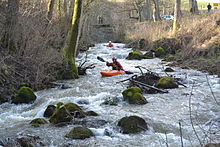Alf (river)
| Alf | |
|---|---|

Rapids in the Strohn Gorge near Strohn
|
|
| Location |
Rhineland-Palatinate, |
| Reference no. | DE: 268 |
| Basin features | |
| Main source | North of Darscheid 549 m above sea level (NHN) 50°13′41″N 6°53′08″E / 50.22806°N 6.88556°ECoordinates: 50°13′41″N 6°53′08″E / 50.22806°N 6.88556°E |
| River mouth | Near Alf into the Moselle 95 m above sea level (NHN) 50°03′26″N 7°07′43″E / 50.05722°N 7.12861°E |
| Progression | Moselle → Rhine → North Sea |
| River system | Rhine |
| Basin size | 358.146 km² |
| Landmarks | Villages: Darscheid, Gillenfeld, Strohn, Bausendorf, Kinderbeuern, Bengel, Alf |
| Tributaries |
|
| Physical characteristics | |
| Length | 51.879 km |
The Alf is a small river in Rhineland-Palatinate, Germany, a left tributary of the Moselle. It rises in the Eifel, near Darscheid, east of Daun. The Alf flows south through Mehren, Gillenfeld and Bausendorf, where it turns east to flow into the Moselle in the village Alf.
The Alf rises about 1 kilometre northeast of Hörscheid in the Volcanic Eifel. From its source at a height of 549 m above NHN the Alf initially flows in a southerly direction. The first village en route is Darscheid which it passes to the east. The next villages on its course are Gillenfeld and Strohn. In the next section as far as Bausendorf the course of the Alf is very winding. Whereas hitherto it had flowed mainly towards the south, now it turns towards the east and cuts through the south of the forest of Kondelwald passing the villages of Kinderbeuern and Bengel. Around 3.5 kilometres beyond Bengel it changes course abruptly and swings north. A ridge prevents it from flow further east to the River Moselle here just 500 metres away. After breaking through the Moselle Hills the Alf finally empties into the Mosell at Alf (Cochem-Zell) at an height of 95 m above NHN. Along its 53-kilometre course from source to mouth, the Alf descends through 454 metres, giving it an average river bed gradient of 8.6 ‰.
...
Wikipedia
